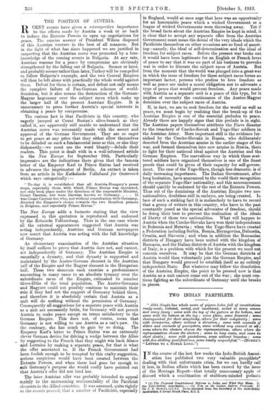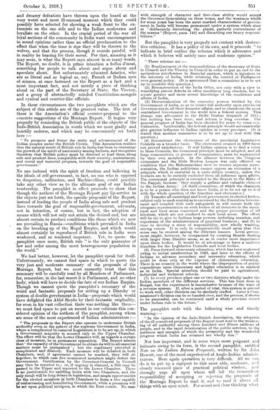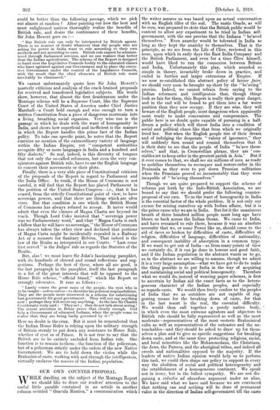TWO INDIAN PAMPHLETS.
" Abbb Sieyes has whole nests of pigeon-holes full of conatitutiont ready-made, ticketed, sorted, and numbered, suited to every season and every fancy : some with the top of the pattern at the bottom, and some with the bottom at the top ; some plain, some flowered ; some distinguished for their simplicity, others for their complexity ; some with directories, others without a direction ; some with councils of elders and council., of youngster*, some without any council at aj; some where the electors choose the representatives, others where die repPesentativee choose the electors ; some in long coats, and some pi short' cloaks ; some with pantaloons, soma without breeches ; some with five-shilling qualifications, some totally unquatifled."—(Buarz's " LETTER TO A NOBLE LORD.")
TN the course of the last few weeks the Lndo-British Associ- ation has published two very valuable pamphlets* dealing with that unfortunate crisis, for we can hardly call it less, in Indian affairs which has been caused by the issue of the Montagu Report—that totally unnecessary apple of discord which a combination of stubborn-minded pedants • (1) The Proposed Constitutional Reforms in India and What the, Mean. B2 the Indo-Britleh Aaeoefation.--(2) Note on the Indian Reform Propoaals.
Sir J. P. Hewett, To be obtained Dom the Secretary of the Indo-Britial Association. 6 Broad Skeet Place, B.O. 2. and dreamy defeatists have thrown upon the board at the very worst and most ill-omened moment which they could possibly have selected for showing a weak front to the ex- tremists on the one side and to the Indian moderates and loyalists on the other. In the crucial period of the war all loyal sections of the community in India want encouragement in sound opinions rather than an official proclamation to the effect that when the time is ripe they will be thrown to the wolves, and that the process, though it sounds painful, will in reality be bracing for their moral. For that, amazing as it may seem, is what the Report says almost in so many words. The Report, no doubt, is in prime intention a ballot& d'essai, something for people to talk about and argue about and speculate about. But unfortunately educated Asiatics, who are as literal and as logical as, say, French or Italian men of science, at once fastened on the Report as a fact and a most important fact, and not merely a piece of thinking aloud on the part of the Secretary of State, the Viceroy, and a group of abstractedly minded Constitution-mongers
and cynical and courtier-like officials.
In these circumstances the two pamphlets which are the subject of this article are of the greatest value. The first of these is the Association's official counter-proposal to the concrete suggestions of the Montagu Report. It begins very properly by reminding the British public of the objects of the Indo-British Association in words which we most gladly and heartily endorse, and which may be conveniently set forth here :— " To promote and foster the unity and advancement of the Indian peoples under the British Crown. 'this Association realizes that the natural result of British rule in India has been to encourage the growth of the spirit of nationality among Indians, and recognizes therefore that British policy must be directed to lead them along safe and prudent lines, compatible with their security, contentment, and moral and material progress, towards the goal of responsible government."
No one imbued with the spirit of freedom and believing in the ideals of self-government, in fact, no one who is opposed to despotism, militarism, and Machiavellism, could possibly take any other view as to the ultimate goal of our Indian trusteeship. The pamphlet in effect proceeds to show that though the authors of the Montagu Report pay lip-service to the objects just set forth, the specific proposals-of the Report, instead of leading the people of India along safe and prudent lines towards the goal of responsible government, advocate, not in intention, of course, but in fact, the adoption of means which will not only not attain the desired end, but are almost certain to produce conditions like those which we now see prevailing in Russia—conditions which prevailed in India on the breaking up of the Mogul Empire, and. which would almost certainly be reproduced if British rule in India were weakened, and so rendered impotent. Yet, to quote the .pamphlet once more, British rule "is the only guarantee of law and order among the most heterogeneous population in the world." ■ We had better, however, let the pamphlet speak for itself. Unfortunately, we cannot find space in which to quote the very just and moderate summary of the proposals of the Montagu Report, but we most earnestly trust that this summary will be carefully read by all Members of Parliament, for, remember, in the last resort it is Parliament, and no other body, which will have to decide the fate of our Indian Empire. Though we cannot quote the pamphlet's summary of the weird and fantastic proposals for setting up a Diarchy or system of double government in India—proposals which would have delighted the Abbe Sieyes by their fantastic originality, for even in his vast collection there was nothing like them— we must find space to put on record in our columns this con- sidered opinion of the authors of the pamphlet, among whom are some of the most experienced of Indian administrators :— "The proposals in the Report also operate to undermine British authority even in the sphere of the supreme Government in India, where .a complicated bi-cameral Legislature is to be set up, in which a Government majority ia secured only in the 1Jpper Chamber. The effect will be that the Lower Chamber will, as regards a certain class of measure, be in permanent opposition. The Report admits that' the capacity of the Government to obtain its will in all essential matters must be unimpaired ' ; but the machinery provided is oomplicated and dilatory. Each measure will be debated in both Chambers, and, if agreement cannot be reached, they will sit together, in which case five nominated members might defeat the Government. Certification by the Governor-General in Council may then be resorted to ; or, if urgency is claimed, a Bill may be passed in the 'Upper and reported to the Lower Chamber. There Is no justification for saddling India with two Chambers, and the only result will be long delays in legislation, and ample opportunities for the elected members in both Chambers to form- a bloc capable of embarrassing and humiliating Government, while a premium will be set upon political intrigues, in which the East excels. No man with strength of character and first-class ability would accept the Governor-Generalship on these terms, and the weakness which for some years has been the moat marked characteristic of govern- ment in India will become permanent under a system which aims at deliberately disturbing the placid, pathetic contentment of bthilietesmiasrs ' (Report, para. -144) and discarding our heavy responsi-
But the pamphlet is very properly not content with destruc- tive criticism. It has a policy of its own, and it proceeds " to indicate in brief outline the reforms which it advocates and which it believes will satisfy sane and moderate opinion."
" These reforms are :— (1) Readjustment of the responsibilities of the Secretary of State in Council and the Viceroy in Council in order to put an end to the meticulous interference in financial matters, which is injurious to the interests of India, while retaining the control of Parliament over general policy. at is announced that a committee is to be set up to consider this question.) (2) Reconstruction of the India Office, not only with a view to remedying patent defects in office machinery long obsolete, but to secure greater and more recent knowledge of the conditions and affairs. of India.
(3) D.ecentralisation of the excessive powers wielded by the Government of India, so as to confer full authority upon provincial Governments in all their domestic affairs, and to transform the most centralised Government in the world into a federal system. Tide change was advocated in the Delhi Durbar despatch of 191.1; but nothing has been done, and reform is long overdue. The general progress of India has been checked for years by crass cen- tralisation. Incidentally, the federal principle would automatically give greater influence to Indian opiruon in every province. (It is stated that another committee is to be set up to deal with this. question.)
(4) Reconstruct the electorates of the provincial Legislative Councils on a broader basis. The electorates created in 1909 have not proved satisfactory. If real Indian opinion is to find a voice in these Councils, the communal principle must be adopted, and all large communities, or groups of communities, must be represented by their own members. As the alliance between the Congress extremists and the little Moslem League was only effected on condition that the Mahonunedans were to receive separate repre- sentation, the Indian politicians cannot oppose an extension of a principle which is essential in a caste-ridden country, unless the workers are to be entirely excluded from all influence upon affairs. The communal principle is extended in the Report to the Sikhs of the Panjab, because they supply a gallant and valuable element to the Indian Army.' (A third committee, of whioh the chairman is to be a person who does not know India, is to be set up to deal with the whole question of the franchise and electorates.) (5) Transfer all municipal and local government to elected bodies, subject only to such control as is exercised by the Executive Govern- ment and coupled with such safeguards as will ensure both the adequate representation on such bodies of all interests in the muni- cipal and local areas concerned and the proper protection of all Interests, which are not confined to such local areas. The effect will be (a) to give to Indians large powers, including taxation, and experience of the administration of practical business ; and (b) in time to develop a sense of responsibility, now wholly wanting, among voters. It is only in comparatively small areas that this sense can be created among the illiterate masses. Local govern- ment might, however, be reorganised by creating Boards dealing with larger than District areas, so as to confer more importance upon these bodies. It would be of advantage to have a uniform franchise for the Legislative Councils and local bodies. (6) Press forward elementary education, which has been neglected owing to initial misdirection in 1833, and later to the efforts of Indians to advance secondary and university education, which could be done only at the expense of elementary education. There is no country in the world where the disproportion of public expenditure upon elementary and higher education is so marked as. in India. Special attention should be paid to agricultural, industrial and technical schools. (7) In every province place one or two districts wholly under the Indian members of the different services. This has been done in Bengal, but the experiment is inoonolusive because of the want of a revenue system. If, after a period of trial, this-system is proved to work well, other districts can be similarly staffed. Later a Com- missioner's division can be so handed over, and the process, if shown to be successful, can be continued until a whole province comes under Indian rule in the future."
The pamphlet ends with the following wise and timely warning :— "In the opinion of the ludo-British Association, the adoption of the ill-conceived proposals of the Report must lead to the weaken- ing of all authority among three hundred and fifteen millions of people, and to the rapid deterioration of the public services, to the guidance and energies of which the prosperity and the wonderful progress which India has attained are wholly due."
Not less important, and in some ways more poignant and intimate owing to its form, is the second pamphlet, entitled Note on the Indian Reform Proposals, written by Sir John Hewett, one of the most experienced of Anglo-Indian adminis- trators. Here again quotation is very difficult. All we can do is to put up a signpost to this most able, moderate, and closely reasoned piece of practical political wisdom, and strongly urge all upon whom will fall the tremendous responsibility of accepting or rejecting the proposals of the Montagu Report to read it, and to read it above all things with an open mind. For sound and clear thinking what could be better than the following passage, which we pick out almost at random ? After pointing out how the best and most enlightened natives thoroughly realize the benefits of British rule, and desire the continuance of these benefits, Sir John Hewett goes on :— " But British rule can only be interpreted by British agents. There is no manner of doubt whatever that the people who are asking for power in India want to rule according to their own methods and not according to ours. British rule cannot be adminis- tered through Indianised services, and no one realises that better than the Indian agriculturist. The scheme of the Report is designed to hand over the Legislative Councils bodily to the educated classes who have agitated against our Government and to place the execu- tive Government under the control of the Legislative Councils, with the result that the chief elements of British rule must inevitably be eliminated."
We cannot unfortunately quote here Sir John Hewett's masterly criticism and analysis of the crack-brained proposals for reserved and transferred legislative subjects. His words show, however, that almost the first desideratum under the Montagu scheme will be a Supreme Court, like the Supreme Court of the United States of America under Chief Justice Marshall—a Court bold enough and wise enough to turn a written Constitution from a piece of dangerous mortmain into a living, breathing social organism. Very wise too is the passage in which he deals with the want of homogeneity in India, and shows how superficial and inefficient is the manner in which the Report handles this prime fact of the Indian polity. To take one specific point, he notes that the Report contains no mention of the extraordinary variety of language within the Indian Empire, yet "competent authorities recognize fifty or more languages in India and a hundred and fifty dialects." So real, indeed, is this diversity of tongues that not only the so-called reformers, but even the very con- spirators against British rule, have to use the English language to concert their movements or their plots.
Finally, there is a very able piece of Constitutional criticism of the proposals of the Report in regard to Parliament and the India Office. In truth, if the House of Commons is not careful, it will find that the Report has placed Parliament in the position of the United States Congress—i.e., that it has ceased, from the strictly Constitutional point of view, to have sovereign powers, and that there are things which are ultra vires. But that condition is one which the British House of Commons has always refused to accept. It never would admit that even the clauses of Magna Charta are beyond its reach. Though Lord Coke insisted that "sovereign power was no Parliamentary word," and that "Magna Carta is such a fellow that he will have no sovereign," the House of Commons has always taken the other view and declared that portions of Magna Carta might be incidentally repealed in a Railway Act or a measure for Sanitary Reform. That indeed is the law of the Realm as interpreted in our Courts. "Last come first served" is the Judges rule as regards the Statutes of the Realm.
But, alas ! we must leave Sir John's fascinating pamphlet, with its hundreds of shrewd and sound reflections and sug- gestions. Perhaps the best of these, where all are good, is the last paragraph in the pamphlet, itself the last paragraph in a list of the great interests that will be opposed to the Home Rule scheme, "official brand," which the Report so strongly advocates. It runs as follows :— "Lastly comes the great mass of the people, the ryot who is to be taught—nolena volens—to shoulder his political responsibilities. They are the people most interested in a scheme for substituting bad government for good government. They will not say anything now : perhaps they will never say anything. As the late Sir Charles Crosthwaite truly said : They act ; they do not talk about acting.' The recent atrocities in Behar prove that clearly enough. God help a Government of educated Indians, when the people come to realise that they are being badly governed by it !
Here no doubt is the crux. But it must be remembered that the Indian Home Ruler is relying upon the military strength of Britain sternly to put down any resistance to Home Rule, whether of ryot or of Prince. It is not true to say that the British are to be entirely excluded from Indian rule. One function is to remain to them—the function of the policeman, but of a policeman strictly under the orders of the new Native Government. We are to hold down the victim while the Brahminical caste, working with and through the intelligentsia, virtually enslaves the masses of the Indian population.




































 Previous page
Previous page